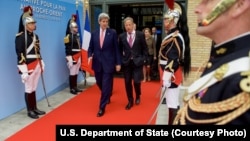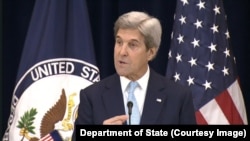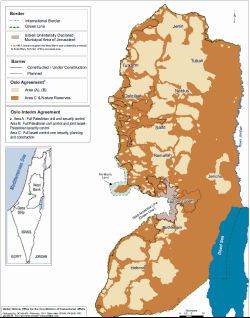In one of his last missions as U.S. secretary of state, John Kerry will join world leaders from 70 other countries at a January 15 conference in Paris, attempting to salvage a two-state solution that many analysts believe is beyond saving. Neither Israel nor the Palestinians will attend, but there are reports the Palestinians may present a new peace plan on the sidelines.
In a similar conference in Paris last June, officials divided into working groups to explore ways to lure the parties back to peace talks. They will present their findings at next week’s meeting.
Israeli Prime Minister Benjamin Netanyahu and his supporters in Washington are uneasy about the meeting, which comes in the wake of U.N. Security Council Resolution 2334, which demands an end to Israeli settlements which it calls “a flagrant violation under international law.” The United States has vetoed dozens of similar resolutions in the past, but this time abstained from voting, allowing the resolution to pass.
Kerry explained the action in a speech December 28. “We cannot properly defend and protect Israel if we allow a viable two-state solution to be destroyed before our own eyes,” he said.
The resolution also calls for states to “distinguish, in their relevant dealings, between the territory of the State of Israel and the territories occupied since 1967.” Israel worries this could lend momentum to the Boycott, Divestment and Sanctions [BDS] movement or trigger a full blown investigation of the settlements by the criminal court in The Hague.
BDS refers to a political movement aimed at putting economic pressure on Israel to end its occupation of Palestinian territory.
Last week, the House of Representatives voted to condemn Resolution 2334, in part, said Foreign Affairs Committee Chairman Ed Royce (R-CA), “to head off any more moves the Obama administration might have in the next few days.”
Shortly after the resolution passed, U.S. President-elect Donald Trump tweeted, “As to the U.N., things will be different after Jan. 20th.” His choice for ambassador to Israel, David Friedman, supports the Israeli settlements and has said he opposes the two-state solution.
The Netanyahu government and its supporters in Washington still worry that during his remaining days in office, U.S. President Barack Obama might formally declare a Palestinian state or support a French resolution in the Security Council declaring two states and redefining borders.
Ron Kampeas, Washington bureau chief for the Jewish Telegraphic Agency, thinks it highly unlikely.
“The Obama administration has pretty much said that it's said what it’s had to say by allowing the U.N. Security Council vote to go through,” Kampeas said. “Sure, they have five days to try and do something before Donald Trump is inaugurated; but, the mechanics of coming up with a resolution, convening the Security Council, getting it through, drafting it, making sure it looks okay? I just don’t see it happening.”
New Palestinian plan?
Citing an anonymous source inside the PLO, Israeli diplomat and Peres Center for Peace founder Uri Savir wrote that “pragmatic” PLO officials have developed a plan for a new interim agreement that would establish a transitional Palestinian state until negotiations on permanent status can be launched a year from now.
The Oslo II Accord divided the West Bank into three administrative areas, Areas A, B and C. Area A falls under total Palestinian control. Area B falls under Palestinian civil authority and shared Palestinian and Israeli security control. Area C, representing about 60 percent of the West Bank, is controlled by Israel and is the area where settlers are located.
The plan, detailed on the Al-Monitor news site last week, would give Palestinians sovereignty over all of Areas A and B in the West Bank, along with 20 percent of Area C, currently under full Israeli control and home to around 350,000 Israeli settlers. The plan would freeze all future settlement building in Area C; current settlers would be allowed to remain, but live under Palestinian law.
“This initiative - if it’s real - looks like an attempt to capitalize on the UNSC resolution and to put together something that could get primarily European support for another attempt at a two-state solution,” said Michele Dunne, director of the Middle East program at the Carnegie Endowment for International Peace. “Because this is right where we are right now, this question of whether there will be any further attempts at brokering a two-state solution.”
“I have no sense that anyone in the Israeli government would be interested in this proposal,” Dunne said, “and the Palestinians are disunified, so even if the current Palestinian Authority leadership were to accept an initiative like this, many in Israel and elsewhere would say, ‘Well, the Palestinian Authority doesn’t represent that many people anyway.’”
In the end, says Dunne, the proposal sounds like an attempt to keep the two-state solution alive.
“Because a lot of people are saying it’s just over for the two-state solution,” she said, "and if the Palestinian cause doesn’t go away, then the whole thing relentlessly moves toward a one-state struggle."
Savir suggests the plan is an alternative to a third intifada, a possible reaction to “the expected change in U.S. positions by the Donald Trump administration.”
Lawyer and former PLO legal adviser Diana Buttu said that while sporadic acts of violence are inevitable under occupation, Palestinians have other “tools” for achieving their goals.
“That’s where the brilliance of all of these other measures comes in, such as the Boycott, Divestment and Sanctions movement,” she said. “Such as trying to get Israel to be held accountable legally and internationally.”






